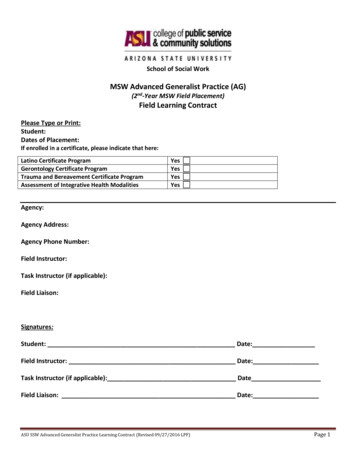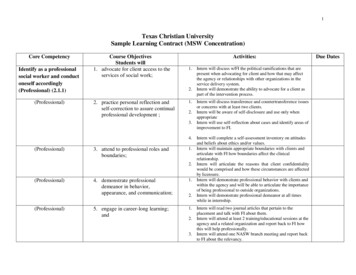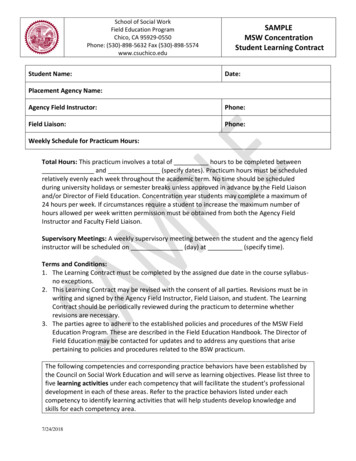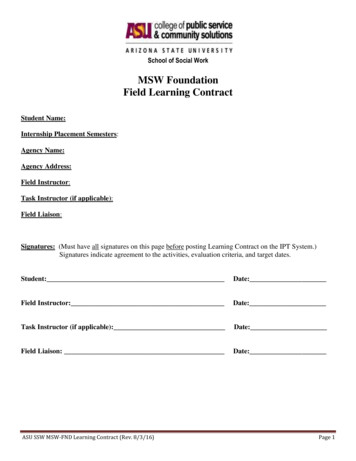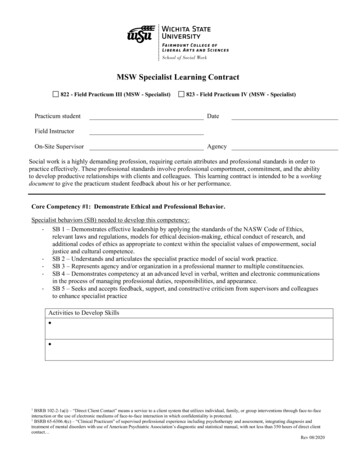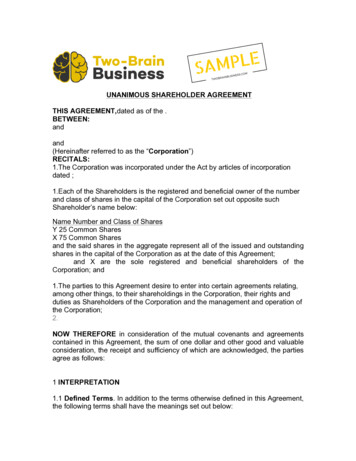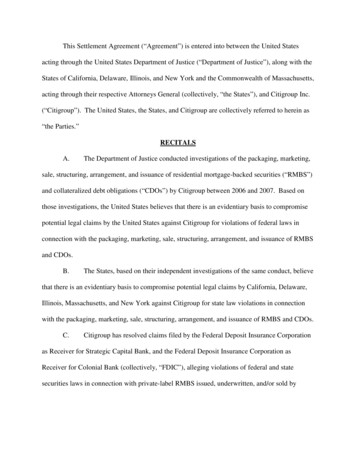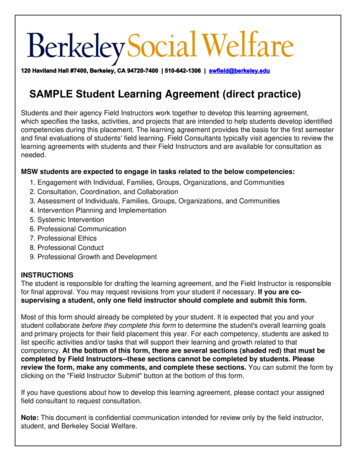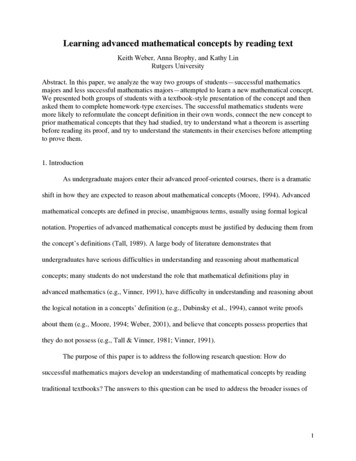
Transcription
LEARNINGAGREEMENTGUIDEMSW Advanced EditionEditionMSW Advanced; Page 1 of 15September 2019
EXAMPLES OF STUDENT LEARNING ACTIVITIESTABLE OF CONTENTSOverviewCompetency-Based EducationLearning Agreement InstructionsPurpose of this Guide333Competency 1Observable Behaviors and Associated Examples4-5Competency 2Observable Behaviors and Associated Examples6Competency 3Observable Behaviors and Associated Examples7Competency 4Observable Behaviors and Associated Examples8Competency 5Observable Behaviors and Associated Examples9Competency 6Observable Behaviors and Associated Examples10Competency 7Observable Behaviors and Associated Examples11Competency 8Observable Behaviors and Associated Examples12 - 13Competency 9Observable Behaviors and Associated Examples14MSW Advanced; Page 2 of 15September 2019
OVERVIEWCOMPETENCY-BASED EDUCATIONSocial Work education is competency-based. Social work competence is the ability to integrate and applysocial work knowledge, values, and skills to practice situations in a purposeful, intentional, and professionalmanner to promote human and community well-being.The framework for competency-based education includes a focus on the assessment of the student's ability todemonstrate the competencies rather than only on the assessment of inputs (such as coursework andresources). Social work practice competence consists of nine interrelated competencies, with specificobservable behaviors for each competency. The overall objective of the practicum is to demonstratecompetency for entry level generalist practice as identified in the nine social work competencies and specificobservable behaviors.The Council on Social Work Education (CSWE) and our social work program recognize a holistic view ofcompetence; that is, the demonstration of competence is informed by the holistic dimensions of knowledge,values, skills, and cognitive and affective processes that include the social worker’s critical thinking,affective reactions, and exercise of judgment in regard to unique practice situations.LEARNING AGREEMENT INSTRUCTIONSThe Learning Agreement is developed collaboratively by the student, field instructor, and faculty field liaison.The Agreement will describe how the student will specifically apply the competencies in observable wayswithin the internship setting. The completed Learning Agreement then represents the student’s specificobjectives for the internship.Observable behaviors are listed below each competency. In the subsequent text boxes, please describe thespecific activities the student will complete at the internship setting for each observable behavior listed. Theseactivities should provide opportunities for mastery of each competency, demonstrated and informed by theholistic dimensions of knowledge, skills, values, and cognitive and affective processes.PURPOSE OF THIS GUIDEThe purpose of this guide is to provide you with general examples of activities for the observable behaviorslisted under each competency to assist in supporting your development and creation of site specific activities.The activities associated with a specific observable behavior can look very different in working with differentpopulations and settings. Faculty Field Liaison, Field Instructor and student should make every effort to assurea learning plan for all competencies and observable behaviors. In the rare occasion that a particularcompetency/observable behavior appears completely unavailable at that site, the Faculty Field Liaison shouldcollaborate with the student and field instructor to explore the ways in which that competency may be masteredin the setting. Please consider demonstration of the behavior through simulation as a possible alternative priorto an “N/A” being utilized.MSW Advanced; Page 3 of 15September 2019
MSW ADVANCED COMPETENCIESCompetency #1Demonstrate Ethical and Professional BehaviorClinical social workers understand that the professional relationship and professional ethics are the foundation ofclinical practice. Clinical social workers recognize the importance of the therapeutic relationship, the person-inenvironment and strengths perspectives, the professional use of self with clients, and adherence to ethicalguidelines of professional behavior. Clinical social workers understand their role and the role of otherprofessionals on interprofessional teams and the ethical use of technology for clinical social work practice.Clinical social workers understand and apply ethical standards and model the ethical use of treatment modalitiesin practice.Students will demonstrate the following behaviors by the end of their advanced field practicum:A 1.1Apply ethical decision-making skills to issues specific to clinical social work,including responding to ethical dilemmasq Demonstrate the ability to resolve complex ethical dilemmas in clinical practice from multipleperspectives.q Review agency's policy manual and apply the NASW Code of Ethic to identify points of opposition,agreement and points not addressed by agency policy.q Identify ethical dilemmas that may arise during organizational planning and formulate responses thatare consistent with NASW Code of Ethics.A 1.2Demonstrate professional use of self with clients that integrates an awareness oftheir own professional strengths, limitations, and challengesq Use self reflection and seek feedback from field instructor about personal strengths, limitations andchallenges in clinical practice.q Recognize and avoid dual relationships, discuss with field instructor in supervision.q Identify how personal and professional values impact work within the organization/community.A 1.3Develop, manage, and maintain therapeutic relationships with clients that reflectunderstanding of relationship dynamics, including power differentialsq In both oral and written communication, demonstrate sensitivity to level of expertise andunderstanding of intended audience and convey ideas in a manner that is sensitive to the level ofknowledge and degree of sophistication of others.q Appropriately adjusts choice of words in communicating with different groups (e.g., board members,clients, professional colleagues).q Identify and discuss relationship dynamics with clients as well as discuss them and challenges withpower diffenentials with field instructor.MSW Advanced; Page 4 of 15September 2019
A 1.4Use strategies of ethical reasoning to address the use of technology in clinicalpractice and its effect on clients’ rightsq Evaluate the ethical and appropriate use of technology to facilitate practice outcomes withindividuals, families and small groups.q Become familiar with the use of various technological platforms (computers, databases, GIS, socialmedia, etc.) to advance effective client outcomes and agency governance and protocol efficiency.q Review agency technology policies and process it during supervision and/or apply it to a case.MSW Advanced; Page 5 of 15September 2019
Competency #2Engage Diversity and Difference in PracticeClinical social workers build on the generalist foundation competency to further understand how diversity anddifference characterize and shape the human experience and are critical to the formation of identity. Thedimensions of diversity are understood as the intersectionality of multiple factors including, but not limited to,age, class, color, culture, disability and ability, ethnicity, gender, gender identity and expression, immigrationstatus, marital status, political ideology, race, religion /spirituality, sex, sexual orientation, and tribal sovereignstatus. Clinical social workers also understand the forms and mechanisms of oppression and discriminationand recognize the extent to which a culture's structures and values, including social, economic, political, andcultural exclusions, may oppress, marginalize, alienate, or create privilege and power. Clinical social workersunderstand and integrate into their assessments and interventions the effects on clients of oppression, poverty,marginalization, and alienation, as well as privilege, power, and acclaim.Students will demonstrate the following behaviors by the end of their advanced field practicum:A 2.1Identify the structural and systemic dynamics present in the client’s context andimplications for clients’ intersecting identities and experiencesq Recognize societal conditions that contribute to individual psychopathology and intervenes atmicro, mezzo, and macro levels.q Demonstrate knowledge of and critically analyze ethical issues arising in community organizationpractice, and identify barriers that prevent services from reaching target population and proposeschange in service delivery.q Expand use of basic engagement skills to include understanding of culturally specific norms,customs, and values regarding interpersonal interaction.A 2.2Explore with clients the meanings they attribute to their various social identities,such as race, ethnicity, culture, gender, etc.; how their understanding of who theyare interacts with dominant societal perceptions of the self; and the effect theseidentities and perceptions have on their livesq Engage in continuing education to develop specialized knowledge and understanding of thehistory, traditions, values, family systems, and artistic expressions of major client groups served.q Demonstrate knowledge of when and how to address issues of diversity in clinical practice.q Explore culturally relevant issues when conducting assessments and planning interventions.A 2.3Engage in self-reflection to examine their own values and personal biases and thepossible effects these may have on their clinical relationships.q Gain sufficient self-awareness to eliminate the influence of personal biases and values in workingwith diverse groups.q Apply self-awareness and self-regulation to manage the influence of personal biases and values andrecognize when personal biases may impact/influence ability to serve client.q Identify and manage personal values and distinguish them from professional values that guidepractice.MSW Advanced; Page 6 of 15September 2019
Competency #3Advance Human Rights and Social, Economic, and Environmental JusticeClinical social workers build on the generalist foundation competency to advance human rights and social,economic and environmental justice through their clinical practice. They understand that every personregardless of position in society has fundamental human rights such as freedom, safety, privacy, an adequatestandard of living, health care, and education. Clinical social workers understand the global interconnectionsof oppression and human rights violations and are knowledgeable about theories of human need and socialjustice, as well as strategies for promoting social and economic justice and human rights. Clinical socialworkers identify and integrate strategies for practice that recognize with clients the oppressive structuralbarriers present in their lives and work to ameliorate the impact of those structural dynamics on the clientsystem.Students will demonstrate the following behaviors by the end of their advanced field practicum:A 3.1Engage in clinical practices that promote social justiceq Understand specific contributions of social work in achieving agency mission and goals.q Understand agency, local, state and federal guidelines for addressing oppression and discriminationand apply it to a case/example and identify underserved needs of population served by agency.q Identify and describe forms and mechanisms of discrimination and oppression that adversely affectclient systems.A 3.2Identify systemic and structural barriers in field placement and work settings thatbar specific groups from full societal participation and examine how socialinequality operates at the macro, mezzo and micro level of society, as well aswithin multiple social work service contextsq Identify groups/classes of clients who are disproportionately represented in systems (e.g., AfricanAmericans in the child welfare and legal systems), who receive substandard treatment, who aregiven particular diagnoses, etc. and discuss with field instructor the ways in which these thingscan/should be addressed systemically.q Help clients reflect upon/sort out experiences in which discrimination and oppression play a role.q Function in multiple macro roles (e.g., community planning, community organizing, administration,program development, and evaluation, policy analysis, legislative advocacy, etc.) that promotesempowerment with in the capacity and context of the community organization.A 3.3Demonstrate an understanding of systemic and structural oppression and theireffects on those with dominant and subjugated identities and integrate thisknowledge into direct clinical practice with individuals and familiesq Use knowledge gained in the classroom regarding systemic and structural oppression to help directclinical practice with clients, discuss identified barriers with field instructor and solicite feedback onways to help eliminate these barriers.q Identify and use methods of practice that are designed to work against systemic and structuraloppression.q Elicite information from clients regarding the ways in which they have been oppressed and use thatinformation to inform practice in a way that combats those oppressors.MSW Advanced; Page 7 of 15September 2019
Competency #4Engage in Practice-informed Research and Research-informed PracticeClinical social workers use quantitative and qualitative research methods, multi-disciplinary sources, and multiple waysof knowing to advance the science of social work and to inform and evaluate the efficacy of their clinical practice.Clinical social workers apply the principles of logic, scientific inquiry, and culturally informed and ethical approaches tobuilding knowledge. Clinical social workers are knowledgeable about evidence based interventions, best practices, andthe evidence based research process. Clinical social workers use a critical perspective in applying evidence based practicein assessment and intervention with clients, participate in the generation of new knowledge through research and practice,and use research methodology to evaluate practice.Students will demonstrate the following behaviors by the end of their advanced field practicum:A 4.1Use research methodologies from varied perspectives to identify and criticallyexamine clinical interventions and/or outcomes for particular client systems,problems, and settingsq Evaluates strategies for conducting survey research and selects strategy that is most likely to yieldbest return rate.q Attend seminars/conferences to garner most current information from experts in a specialized areaof practice.q Stay up to date on practices with client population served by agency/population of special interestby reviewing professional literature, attending conferences, searching web resources, etc.A 4.2Use practice experience to critically evaluate relevant clinical knowledge and theneed for additional research to address gaps in the existing knowledge baseq Stay abreast of developing trends in specialized area of clinical practice and advocate forimplementation of promising, innovative practices with field instructor.q Present analysis of an agency policy and makes recommendations with field instructor.q Review literature to identify intervention(s) supported by empirical evidence.A 4.3Evaluate the strengths and weakness of multiple theoretical perspectives anddifferentially apply them to client situationsq Integrate findings from multiple studies re particular problem/ diagnosis to develop most effectiveintervention strategy.q Evaluate service delivery systems to insure that target population is being reached and makerecommendations in supervision to field instructor to improve service accessibility.q Design culturally sensitive evaluation strategies including use of measures validated with specificpopulation(s) served and obtaining feedback from minority clients as stakeholders.MSW Advanced; Page 8 of 15September 2019
Competency #5Engage in Policy PracticeClinical social workers understand that both client systems and social service delivery systems are affected by policyimplementation at the federal, state, and local levels. Clinical social workers help clients to understand the impact of policyon their wellbeing, including, as appropriate, the political nature of policy. Clinical social workers engage in policyanalysis within their practice settings, help clients to resist internalization of self-blame for social and economiccircumstances that reflect policy decisions at the mezzo and macro level, and empower clients to advocate for policychange.Students will demonstrate the following behaviors by the end of their advanced field practicum:A 5.1Understand social welfare systems and policies, the impact of policy on clients andcommunities, and the skills of policy analysisq Identify both formal (laws, polices, etc.) and informal structures (discrimination based on race,sexual orientation, socioeconomic status) that impact members of target population.q Demonstrate knowledge of federal and state statutes and local policies that provide mandate,funding, and boundaries for agency services.q Understand the policymaking process at the local, state, and federal levels and demonstrate the waysadvocates can influence it.A 5.2Use evidence based practice to advocate for policies that advance social andeconomic well- beingq Identify impact of political, social, economic, and cultural forces on services delivered by agency.q Assess the impact of a program design upon the interests of minorities and oppressed groups andproposes indicated changes to insure equitable service delivery.q Assess and diagnose community needs and assets in ways that gather information, increaseparticipation, and strengthen social diversity.A 5.3Communicate to stakeholders the implication of policies and policy change in thelives of clientsq Anticipate development of barriers to service delivery (e.g., budget cuts, negative publicity retarget population) and proposes strategies to prevent disruption of services.q Select appropriate strategies with field instructor in supervision for advocacy (organized protests,letters to official and legislators increasing community awareness via media, etc.).q Demonstrate the capacity to plan and advocate for needed agency policy changes on behalf of aclient group, community, or organizational interest.A 5.4Analyze policies at the agency level and advocate for agency policies that enhanceclient access and the delivery of effective services.q Analyze how agency policy accommodates/fails to accommodate diversity in the community andproposes appropriate changes in policy with field instructor.q Read and research agency policies related to access and service delivery paying attention to howthey have evolved and discuss with field instructors ways in which advocacy for access anddelievery of services can be increased.q Use knowledge gained in the classroom to assist in analizing the policies of the agency related toaccess and delivery of services.MSW Advanced; Page 9 of 15September 2019
Competency #6Engage with Individuals, Families, Groups, Organizations, and CommunitiesClinical social workers understand that engagement is an ongoing component of the dynamic and interactive process ofclinical social work practice with, and on behalf of, diverse individuals, families, groups, organizations, and communities.Clinical social workers rely on advanced clinical knowledge to build relationships with clients' systems andinterprofessional partners. They possess a clinically-informed understanding of reasons why clients might be motivated orhesitant to engage in services and they demonstrate a range of clinical skills that allow them to effectively engage thosethey serve.Students will demonstrate the following behaviors by the end of their advanced field practicum:A 6.1Apply clinical knowledge to the
The Council on Social Work Education (CSWE) and our social work program recognize a holistic view of competence; that is, the demonstration of competence is informed by the holistic dimensions of knowledge
